Job enlargement and job enrichment are both used as techniques for employee motivation and satisfaction. However, they differ a lot from each other. The critical difference is job enlargement is a horizontal expansion of duties and tasks across the same organizational level, whereas job enrichment is the vertical expansion of the roles, responsibilities, authority and activities along with the different hierarchical levels.
Job enlargement is a technique used for motivating the semi-skilled or unskilled workers and may be misinterpreted as work overload without a good hike in salary. Job enrichment is used for development and satisfaction of the skilled employees which is usually taken as a reward of good work.
Content: Difference Between Job Enlargement and Job Enrichment
- Difference and Comparison
- Example
- What is Job Enlargement?
- What is Job Enrichment?
- Benefits
- Limitations
- Summary
Difference and Comparison
| Basis | Job Enlargement | Job Enrichment |
|---|---|---|
| Meaning | Job enlargement refers to increasing the number of tasks to be performed by an employee to reduce work related boredom. | Job enrichment is that motivational tool which allows more decision making power and work related authority to the employees. |
| Tool or Technique | Job Design Technique | Management Tool |
| Objective/Purpose | Reduce Boredom and Monotony | Make Job Challenging |
| Skills Requirement | No | Yes |
| Expansion | Horizontal | Vertical |
| Level of Responsibility | Remains the Same | Increases |
| Level of Authority | Remains the Same | Increases |
| Directions | Supervisor's Direction | Self-Directed |
| Dependency on Each Other | Independent | Dependent |
| Supervisory Control | More | Comparatively Less |
| Result | Positive or Negative | Usually Positive |
Example
Job Enlargement
A person hired to handle the reception work is responsible for handling customer enquiries, queries and calls on the front desk. She kept on doing the same work for two years and got bored. She discussed the problem with the HR manager, who planned to implement job enlargement for making her job profile interesting.
Few more task were added to her job profile like interacting with the clients and making outbound calls to create new customers for the company. These added tasks reduced her monotony.
Job Enrichment
A human resource executive was initially responsible for maintaining the employees’ record and calling the candidates for interviews as directed by the HR manager. To add more value to the HR executive’s job profile, the manager gave him some authority related to the work already assigned to him.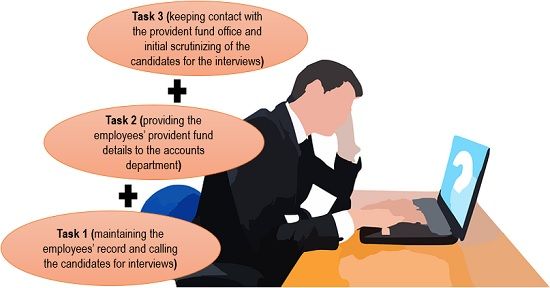
The new responsibilities included providing the employees’ provident fund details to the accounts department, keeping contact with the provident fund office and initial scrutinizing of the candidates for the interviews. These additional responsibilities hold authority and accountability, making the employee more efficient, confident and satisfied with the job.
What is Job Enlargement?
Job enlargement refers to that job design technique which integrates the various tasks performed at the same level(horizontally) to the employee’s existing job duties.
Features of Job Enlargement
Job enlargement is a suitable technique for companies where a centralized organizational structure is followed, and the number of employees is limited. To understand the concept in a better way, let us go through its features: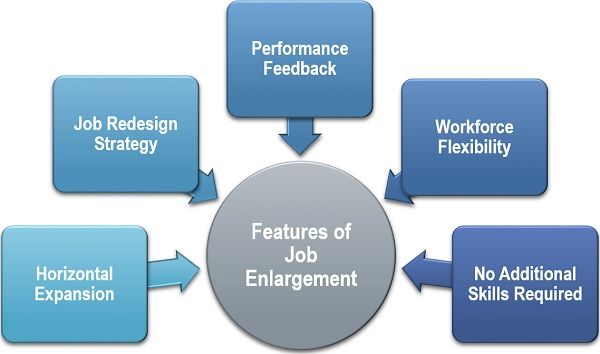
- Horizontal Expansion: In job enlargement, the number of task, responsibilities and duties are increased which are at the same level or similar to the existing job position.
- Job Redesign Strategy: It can be referred to as job redesigning, i.e. preparing the work modules such that optimum utilization of the employee’s efficiency can be done.
- Performance Feedback: It encourages the employees to give meaningful feedback on their performance and job profile.
- Workforce Flexibility: The scope of the job responsibilities is widened, and employees are motivated to be versatile in their work, thus initiating workforce flexibility.
- No Additional Skills Required: The employees are given tasks similar to the ones which they are already performing. Therefore no special skills or training is necessary.
What is Job Enrichment?
Job enrichment can be defined as a vertical restructuring of a job, i.e. integration of the tasks, role, responsibilities and authority across different levels in an organization, to add value to the employee’s existing job profile.
Features of Job Enrichment
Job enrichment is a strategy which the organizations use to retain their employees and make them feel worthy. The following characteristics of job enrichment will help us know more about it: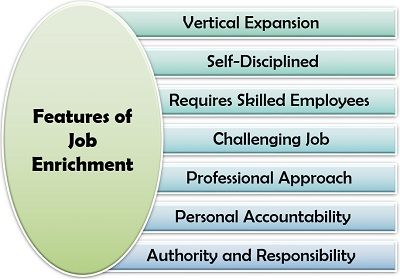
- Vertical Expansion: Job enrichment adds on functions like decision making to the employee’s job profile which was earlier performed by the higher-level superiors. Therefore it is considered a vertical expansion of tasks.
- Self-Disciplined: When the employees hold authority, responsibility and accountability of their work, they tend to maintain a self-disciplined attitude and sincerity towards their role in the organization.
- Requires Skilled Employees: Job enrichment is a tactful strategy which is difficult to be implemented if the employees do not possess decision making and problem-solving skills.
- Challenging Job: Allowing the decision making authority to the employees makes their job more challenging and leads to employee empowerment and engagement.
- Professional Approach: Job enrichment inculcates professionalism in the working and attitude of the employees by providing them with worthiness and recognition.
- Personal Accountability: The employee is wholly and solely responsible for his work, i.e. his excellent work will be appreciated, and poor performance will be criticized.
- Authority and Responsibility: The employees get the liberty of taking decisions related to their work, and the employee is responsible for completing the given task successfully.
Process of Job Enrichment
Job enrichment is not an immediate practice. It requires a lot of planning and proper implementation. Its step by step process is mentioned below:
- Combining Tasks: At the initial stage of job enrichment, different tasks related to a particular job are combined to form a satisfactory job profile for the employees.
- Creating Natural Work Units: The next step is making the employees comfortable by letting them select their work units independently to which they can easily relate and work with.
- Establishing Relationships: Next is the establishment of employees’ cordial relations with the management, associates, clients, social institutions and other external organizations to provide social recognition and boost their morale.
- Expanding Job Vertically: The job must be developed qualitatively, i.e. the activities of the higher level are added to the employee’s job profile. Thus, increasing the authority and responsibility in a job enhances the employee’s performance.
- Opening Feedback Channels: Lastly, the employees are free to share their problems and views, and the management can guide and suggest performance improvements and ways to overcome weaknesses.
Benefits of Job Enlargement
Job enlargement is a short term strategy, i.e. it can be used to motivate the employees instantly but may not last for a long time. To know the various advantages of adopting job enlargement, read below: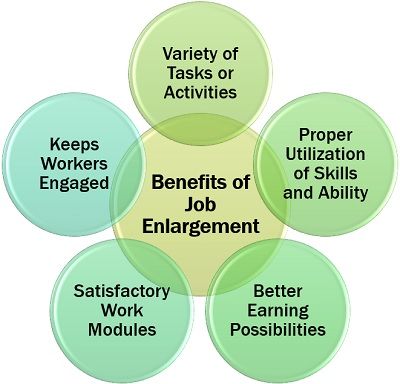
The work becomes tedious if an employee has to perform the same activities daily. Thus, the employee is allocated some different tasks in addition to the existing job profile. With the allocation of new responsibilities, the employees put in more skills, knowledge and efforts to accomplish the given task.
After taking up new responsibilities, duties and tasks along with increased workload, the skills and abilities of the employees are increased. Thus, they can ask for a better salary while switching the job. The work modules formed under job enlargement are related and diversified, improving the job satisfaction of the employees.
The employees have a variety of activities which reduces the monotony of performing similar tasks all the time. This makes the work more exciting and keeps the employees engaged.
Benefits of Job Enrichment
Job enrichment is widely practised by many of the companies to simplify their work and reduce the level of job dissatisfaction among the employees. The following are some of the advantages of adopting the strategy of job enrichment: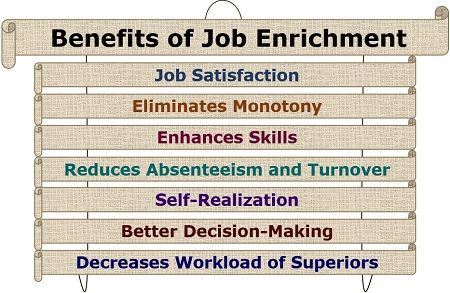
By performing similar tasks daily and following the superior’s instructions at every stage creates boredom and dissatisfaction. Therefore, job enrichment removes these barriers to enhance employee’s performance. The amended job profile along with the delegation of authority and responsibility leads to job satisfaction among the employees.
The employees regularly performing the same work gets frustrated and finds out ways to escape work, either through absenteeism or employee turnover. Thus, job enrichment protects the organization from such situations. Job enrichment brings out leadership skills and also helps the employees in learning new work-related skills also.
Job enrichment motivates the employees and boosts their morale and confidence to provide opportunities for self-realization. The employees working on a particular project hold better control and have in-depth knowledge of the work. Therefore, with the help of job enrichment, they can make their own decisions which are more beneficial to the organization.
Job enrichment decreases the superiors’ control over the employees’ operations and functioning and saves their time on taking all the decisions by themselves.
Limitations of Job Enlargement
Job enlargement has proved to be inefficient for the large organizations where the workload is high and direct control of the management is low. The following are some of the other disadvantages of job enlargement: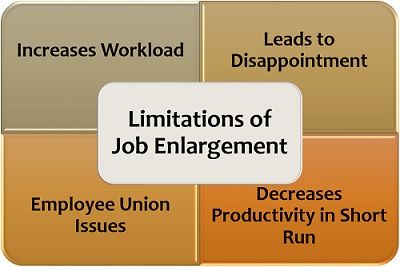
The practice of job enlargement adds new tasks to the existing duties, ultimately increasing the employee’s workload. Moreover, increasing the workload without increasing the workers’ compensation, decreases the employee’s morale and satisfaction.
Job enlargement is assumed by employee union as worker’s exploitation, i.e. work overload at low compensation. Since the employees take time to adapt to the new tasks allocated to them, the productivity is hampered in the short run.
Limitations of Job Enrichment
Job enrichment may seem to be unsuitable for the organizations where the employees are unskilled or semi-skilled. Let us understand the various disadvantages of job enrichment mentioned below: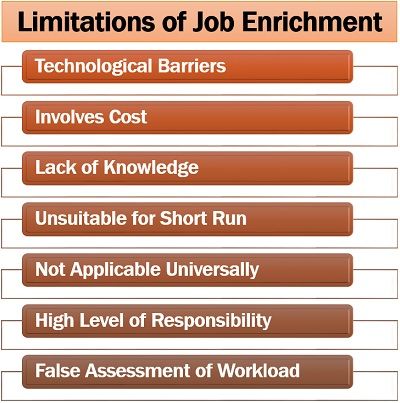
Technology sometimes hinders the application of job enrichment in the organizations since the technical functionality of the machines may not require any changes in the jobs. Job enrichment demands training of employees and restructuring of the work. All this need finance which is sometimes higher than the profits earned.
At times, the employees fall short of the skills knowledge and expertise required to perform a particular task. Job enrichment is a time-consuming process, and the productivity of the organization will suffer, in the short run since the employees may take time to become comfortable and accustomed to such practice.
The concept of job enrichment does not apply to all type of business organizations. Some specific organizations may not need any advancement due to a standardized system.
The managers sometimes lack skills for forming effective work teams and may overload one employee with many responsibilities while the other may left idol with limited duties. Moreover, all the employees may not be able to handle the higher set of duties given to them and may feel pressurized.
Summary
Let us now summarize the above points of differences into the following:
- Job enlargement is the combining of different tasks, duties and activities performed on the same level of the organization. Whereas, job enrichment combines the activities across the different hierarchical levels of the organization along with the allocation of decision making power and authority.
- Job enlargement is a technique of job design. However, job enrichment is management used as a strategy by the organizations.
- When the former is used for reducing the boredom arising from routine work, the latter is done with the objective of making the job challenging and interesting for the employees.
- In job enlargement, the employees do not require any special skills. But in job enrichment, the employees must possess skills of decision making.
- The former is a horizontal expansion of tasks across the same level of the organizational hierarchy. The latter is a vertical expansion of the activities involving decision making along with the different levels of the organizational hierarchy.
- The employee’s level of responsibility does not change in case of job enlargement whereas the same increases with the implementation of job enrichment.
- The authority in case of job enlargement remains constant, and no extra decision-making power is allocated to the employees. On the contrary, job enrichment allows more body and decision making power in the hands of the employees.
- All the activities of the employees in job enlargement directed by the superior. Whereas in job enrichment, the employees become self-directed and make their path.
- When the former is an independent practice which merely increases the employees work without any use of job enrichment. The latter requires job enlargement or is an addition of decision making authority to the increased workload.
- In job enlargement, the complete control of the employees’ activities is with the superior. In job enrichment, the employees exercise self-control over their actions and decisions.
- The result of job enlargement is unpredictable and can be positive if employees get motivated or contrary if they feel overloaded with work. The result or outcome of job enrichment is usually positive leading to employee satisfaction and self-actualization.
The small scale companies are centrally managed by the owners and do not have many departments. Therefore they use job enlargement as a motivational tool.
The large scale industries, where the workload is high and the organizational structure is decentralized into various departments; job enrichment is essential to provide job satisfaction and growth of the employees.
R.Baskaran says
Neatly Written
Rasmina says
Relevent information and neatly written ..good job.!!
Dr P.K.Sinha says
Excellant and nicely written.
Asma says
Thank you this really helped.